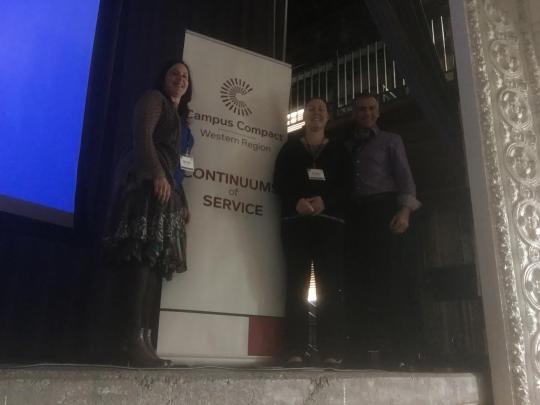The Continuums of Service Conference 2017: On Reflection
While at the Continuums of Service Conference held at the Metropolitan State University's campus, I attended a session on student-led service-learning reflection where the famous quote by John Dewey was brought up, "We do not learn from experience ...we learn from reflecting on experience." It made me wonder, can you really learn by doing if you're not reflecting on it? I know that when we talk about service-learning, a big component of this is the reflection component.
My first reaction to the quote was, of course you can learn without reflecting, but now I'm not so sure. You could have the most amazing experience doing something, but if you just move on after you do it and don't think about what you did, why you did it, what the benefits of you doing that thing was, then do you really learn from it? Could it affect you? Sure. Could it make you emotional? Sure. But as far as actually learning from the experience, it seems that the reflection component is arguably the most crucial component and likely the most overlooked in service-learning. It's often the thing that gets thrown in at the end, or if we have time to do it, and it is often not focused on nearly as much as the planning that goes into the service-learning projects.
Faculty are often not trained in the reflection side of service-learning-so they do their best to come up with a reflection that works but often not enough time is given to this reflection. There is also often a grade tied to the reflection which seems like the wrong way to do this. How is a student to be honest with his or her reflection when they are being graded on it? What about when they are trying to say what they think the professor wants to hear rather than his or her honest assessment of the activity? It brings up an interesting predicament. If the reflection aspect of service-learning is arguably the most important one and we're shortchanging this component, then the students aren't getting as much out of the experience as they should be and they are the ones who suffer. How can we combat this and make the reflection more central to the actual experience? How can we train faculty or student leaders to help facilitate these reflections and discussions? How can we make it easier on all parties involved to buy into the reflection process more? Honestly, I don't know the answers to these questions, but I think these are important questions that need to be addressed in order to fully utilize service-learning and maximize learning potential for everyone involved.
Related: Reflection
The keynote speaker for lunch on Friday was https://www.du.edu/ahss/psychology/facultystaffstudents/faculty-listing/deprince.html, the department chair of the Psychology Department at the University of Denver who specializes in community-engaged research on violence/trauma. She brought up the term "mutually beneficial relationships," which is a term often used in the definition of public relations I use when teaching public relations. The idea that these relationships must be mutually beneficial is a key component of service-learning. What is the point of service-learning if both sides aren't benefitting from the relationship? The problem is that many forms of service-learning seem to benefit the students more and meet the needs of the students rather than identifying the needs of the community partners and then making the service-learning project work for that.
Related:The Impact of Service-Learning
Another term she used was "collective self-interest" which got me thinking about what that term actually means and how it related to service-learning and community engagement. When we have collective self-interests, we have the motivation to work with each other for the greater good. We have collective agendas that can be furthered in a more meaningful way if we just communicated these agendas and worked together.
During the session that Merith Weisman and I presented, we did something a bit different than a typical conference presentation where there is very little interaction. We chose to do a discussion-based session where we provided prompts, but participants determined where the conversation went and what happened during the session. I found that this type of session worked so much better than the typical conference presentation. The fact that service-learning professionals, faculty, and community partners were able to have the time to discuss what they do, share their experiences, and learn from one another is something that rarely occurs. Two of the participants noted at the end that she wished that the session was longer so we had more time to discuss. Honestly, I think we could have gone for a couple hours discussing, learning, sharing, and providing each other with support and knowledge from our own experiences. Merith also broadcast the share-out portion of the session on Facebook Live.
Though it wasn't the ideal setting for a conference as far as classroom setup, location, etc., there were components of being on a university campus that added to the conference and experience. For example, since it was sexual assault awareness month, the student union had displayed t-shirts hanging three stories high that were made by people affected by sexual assault. The union itself had a very interesting social justice vibe. Nearly all of the posters, flyers, and advertisements that I saw were related to social justice in one way or another, so it tied in with the conference theme.

Author: Emily Acosta Lewis



